Photo Courtesy of Adobe Stock/Esky Studio
Known for the colorful murals that chronicle its past, Midland, Ontario continues to make history today as a focal point for boaters exploring the magnificent 30,000 Islands.
Pretty as a picture?
That’s an apt description when we’re talking about the east coast of Georgian Bay and, in particular, the delightfully welcoming community of Midland, Ontario.
Situated on the southeastern corner of the nav chart, where the endless granite of the Canadian Shield meets the water, Midland marks the gateway to the 30,000 Islands and mile after mile of pure, unspoiled, jaw-dropping beauty. With its first-class marina facilities, excellent shopping and dining options, and stunning vistas that make you wish your eyes were bigger so you could take more of it in, it’s easy to understand why Midland has become a summer favorite for boaters from across the Great Lakes.
This isn’t a new thing either, as the pretty town has a long history of welcoming visiting mariners. This is well documented throughout the community on a series of much larger-than-life murals, most of them painted by the late artist Fred Lenz. The largest of them — painted on the side of the massive A. D. M. Milling grain elevator overlooking the harbor — depicts a 1625 meeting between a Huron warrior and the Jesuit missionary Jean de Brébeuf. That fateful encounter is said to have marked the transition of Midland from a quiet indigenous settlement to what became a bustling transportation hub for fur traders, commercial fishermen and lumber firms, given its position where the overland route from Lake Ontario met the upper lakes.
The small settlement that developed on the site grew exponentially in 1871 when the railway arrived, bringing a steady flow of passengers and goods from Port Hope to fill the fleets of steamships departing for points west. Midland’s outstanding natural harbor provided an ideal transfer point for goods and people headed across the map, giving rise to first-class docks, large hotels, busy taverns and a number of bustling shops. By 1878, Midland incorporated as a proper village and, in 1890, once again as a town.
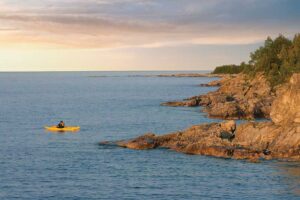 Today, about 16,000 very lucky people make their home in Midland, where the once-bustling commercial harbor has for the most part largely given way to today’s more tranquil base for pleasure craft. Delightful marinas now dot the shorelines where the lumber mills and fish processing plants once stood, with only the occasional laker stopping by these days to remind boaters of Midland’s roots as a commercial transportation hub.
Today, about 16,000 very lucky people make their home in Midland, where the once-bustling commercial harbor has for the most part largely given way to today’s more tranquil base for pleasure craft. Delightful marinas now dot the shorelines where the lumber mills and fish processing plants once stood, with only the occasional laker stopping by these days to remind boaters of Midland’s roots as a commercial transportation hub.
But Midland’s rapid population growth through the last century pales in comparison to today’s annual surge, as the town’s numbers nearly triple every summer with the arrival of tourists from across the region. That includes the occupants of the nearly 8,000 cottages in the area, most of whom use Midland as a departure point for their remote, boat-access vacation homes. As a result of this activity, marinas here rank among the best anywhere, with top-notch facilities for locals and transient boaters alike.
Getting to Midland is fairly easy, but it’s important to keep an eye on your chartplotter as you approach and stay in the marked channels. Those nearby 30,000 islands have at least another 30,000 friends lurking underwater in the form of granite shoals and outcrops, many of them unmarked.
As you enter Severn Sound from Georgian Bay proper, follow the buoyed entrance channel that runs on a course of 152.5 degrees as you pass Beausoleil Island, and particularly around the green buoy marking Candlemas Shoal as it extends from the island’s southern tip. On a clear sunny day, you can often spot colorful streaks in the water here just outside of the marked channel, each one reflecting a different brand of bottom paint or engine lower unit. While great fun for the younger members of your crew (“So how about it kids, was that last one the remains of a Volvo or a Yamaha?”), it’s a collection you don’t want to personally contribute to. Stay in the marked channel that the lakers use and you’ll be just fine.
If the landscape with its stripey granite islands and windblown pines looks hauntingly familiar, it’s likely because you’re recalling classic scenes painted by the Group of Seven. Those rugged Georgian Bay shorelines and adjacent windswept islands with their distinctive wind-worn trees are characteristic features of the Canadian Shield and appear prominently in multiple works by the artists Franklin Carmichael, A.Y. Jackson, Arthur Lismer, Frederick Varley, A.J. Casson and Tom Thomson, all of whom painted extensively in the Midland area. Most of those rugged shorelines appear today exactly as they did a century ago, so a certain sense of deja-vu is inevitable. The only Group of Seven artist to not paint in the Midland region was Lawren Harris, who instead worked farther inland, capturing similar scenes in Ontario’s Algonquin Park.
The marinas in and around Midland offer excellent accommodations for visiting boaters, whether you’re exploring the 30,000 Islands, continuing to Lake Ontario through the nearby Trent-Severn Waterway or, like most, simply there to enjoy Midland’s own unique charms.
Yours to discover
As you arrive in Midland, you’re going to quickly develop a chronic case of swivel neck, in that it’s hard to decide exactly where to look first. Marinas in town and on both sides of it provide plenty of mooring space and transient slips, while a large shopping dock right in the center of Midland allows easy and convenient provisioning.
Perhaps the best way to get your bearings and find your way around town is with a walking tour of Midland’s famous murals. There are 41 of them in all, 34 of which are considered historical murals in that they chronicle the region’s past. You can download an outstanding walking tour guide online (downtownmidland.ca/murals), which includes a helpful map along with photos and full descriptions of each work. Apart from presenting some remarkable artwork, the tour provides an excellent orientation to the town itself and is a wonderful way to spend a first day on site.
While wandering about, you’ll discover Midland has a delightful variety of shops selling local and artisan goods, as well as an enchanting range of cafes and restaurants where you can refresh and plan your next adventure. Best of all, most of them sell butter tarts.
Midland bills itself as the butter tart capital of the world, and with good reason. You’ll see the sweet treats absolutely everywhere in town, and you’ll see plenty of folks munching away just about anywhere you look. Butter tarts — a magical combination of butter, sugar and eggs in a delicate pastry shell — are a uniquely Canadian treat and a matter of cultural pride. They’re sort of like a pecan tart but without the waxy tang, and with a more syrupy consistency and sweeter crust. Individual recipes vary, and are celebrated during Midland’s annual Butter Tart Festival held on the second weekend in June each year. The festival — which attracts around 70,000 visitors to a town of just 16,000 — is internationally famous among foodie types, and a real hit for anyone with a sweet tooth. Visitors typically quaff down something approaching a quarter-million butter tarts over the festival weekend, with fierce competition among bakers for the honors of Best Butter Tart in both “traditional” and “wild style” categories. Celebrity judges, buskers, bands and all manner of butter tart souvenirs from more than 200 different vendors make it a fun festival that’s definitely one of a kind, and sure to bring out everyone’s inner little kid. But even if you miss the big festival, rest assured butter tarts will almost certainly be part of your Midland experience no matter what time of year you visit.
For a more balanced perspective of Midland’s dining scene, consider taking a walking food tour. Held on Fridays and Saturdays through the summer, these three-hour walking tours led by local guides sample the best of Midland’s local cuisine, while sharing cultural insights into what you’re eating, and why. Local fare figures prominently, including seasonal treats like wild blueberries and morels.
Befitting its festive spirit, Midland is home to a wide range of events, festivals and things to do through the season. The town of Midland maintains an up-to-date event calendar on its website (midland.ca) where you can keep abreast of all the latest goings on.
Photo Courtesy of Town of Midland
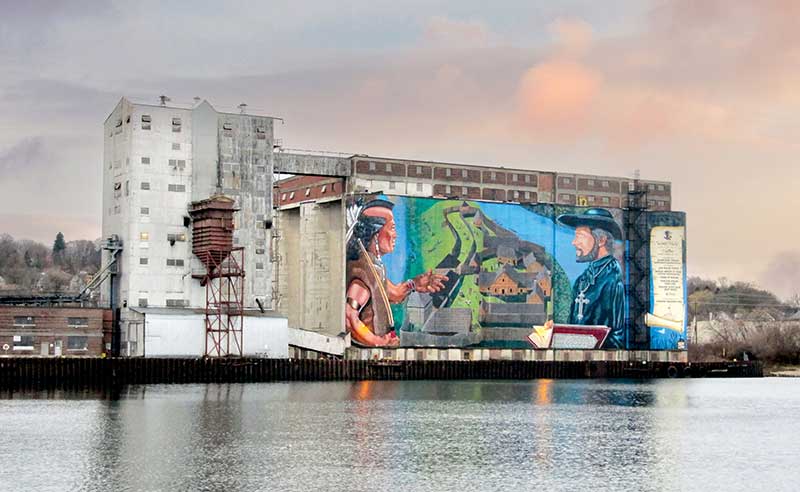
Photo Courtesy of Town of Midland
Above Photo by
Photo Courtesy of Destination Ontario
 All the finer things
All the finer things
As a summer vacation playground, Midland boasts an unusually good selection of restaurants. Some local favorites include The Boathouse Eatery, located at the municipal marina, which has a large patio overlooking the water and live entertainment; Cellarman’s Alehouse, on King Street, which offers very good homemade, traditional pub fare; The Library, which has a diverse menu; and Lilly’s, on King Street, for outstanding classic Italian goodies.
If you’re looking to find some fresh treats to take back to the boat, Midland’s Farmer’s Market, held on Sundays from 9 a.m. till 1 p.m., is an absolute must. There you can find a wide variety of local fruits and vegetables in season, along with baked goods, honey, maple syrup and more.
All that shopping and sightseeing can be awfully tiring, which is no doubt why Midland is blessed with an unusual abundance of enticing day spas and wellness centers. Relax and enjoy some shameless self-indulgence at Bamboo Spa, Panache Spa, Pur Spa, Vincent Spa, Soul Set Studio or Wake Wellness, all within easy walking distance of the public dock.
Out and about
While Midland has much to offer right in town, some of its most appealing attractions sit just a little farther afield, making it a terrific home base for further exploration. You’ll want to either break out the bicycles or some taxi fare, since a few of these are a bit of a hike from the docks.
Located just east of town, the French Jesuit settlement of Sainte-Marie among the Hurons was the first European settlement in Ontario, dating to 1639. Designated as a National Historic Site of Canada, the fortified settlement was established by 18 priests on a mission to introduce Christian Gospel to the Hurons. Just 10 years later it was destroyed amid an ongoing war between the Hurons and the invading Iroquois. Eight of the missionaries were killed, and the settlement was burned to the ground by the retreating French so it couldn’t be used by the invaders.
Reconstructed as a historical site and living museum in 1964, Sainte-Marie among the Hurons today provides an intriguing look at life on the Great Lakes almost 400 years ago, and is always a huge hit with younger members of the crew.
The nearby Martyr’s Shrine commemorates the eight Jesuit priests who were martyred in the conflict. Constructed in 1925 and formally consecrated the following year, the shrine houses the bones of several of the priests including Jean de Brébeuf. The martyrs were canonized by Pope Pius XI in 1930, while Pope John Paul II visited the Martyrs’ Shrine in 1984.
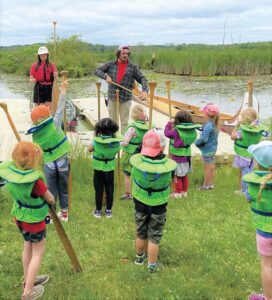 Nearby, the Wye Marsh Wildlife Centre sits on 3,000 acres of provincially significant wetlands affording a tremendous opportunity for wildlife viewing. The marsh is home to a large number of rare trumpeter swans, as well as many other species of waterfowl, which can be easily observed from walking trails, an observation tower and a floating marsh boardwalk. The facility also offers guided canoe and kayak excursions during July and August including Marsh by Moonlight evenings, where your guide leads you through the sparkling moonlit waters after dark for an altogether different wildlife enjoyment experience.
Nearby, the Wye Marsh Wildlife Centre sits on 3,000 acres of provincially significant wetlands affording a tremendous opportunity for wildlife viewing. The marsh is home to a large number of rare trumpeter swans, as well as many other species of waterfowl, which can be easily observed from walking trails, an observation tower and a floating marsh boardwalk. The facility also offers guided canoe and kayak excursions during July and August including Marsh by Moonlight evenings, where your guide leads you through the sparkling moonlit waters after dark for an altogether different wildlife enjoyment experience.
If you’re simply looking to stretch your legs after a couple of days on the boat, Midland’s Rotary Hiking Trail starts at the town dock and follows a meandering one-mile path around the harbor through beautiful gardens, past delightful waterfalls and eventually concludes at Little Lake Park. There, the Huronia Museum presents a replica of a pre-contact Huron village, including a lookout tower, wigwam and full-size longhouse. The museum’s exhibit gallery includes thousands of historic artifacts ranging from photographs to native archaeology and art by members of the Group of Seven.
If you’re in Midland over the Canada Day national holiday on July 1, then Little Lake is very much the place to be for the town’s annual fireworks display.
Golfers will find plenty to celebrate with Midland’s two excellent courses. The Midland Golf and Country Club, just west of town, is an 18-hole course offering club and cart rental, as well as a nice dining room with an outdoor deck. South of Little Lake is Brooklea Golf and Country Club, a 27-hole course with club and cart rental available, as well as a driving range and putting green, a pool, a fitness center and a lovely restaurant.
Of course the biggest draw is the adjacent 30,000 Islands and the Georgian Bay Islands National Park. If you don’t want to take your own boat, cruise vessels depart right from the Midland town dock offering narrated, and in some cases fully catered, tours through the nearby islands, giving visiting mariners a taste of what further exploration on their own craft might look like.
As one might expect, all those islands provide a tremendous variety of fish habitat, and Midland is justifiably known for its outstanding angling opportunities. Largemouth bass, smallmouth bass, walleye, pike, muskie and panfish can all be found in abundance, providing a great opportunity to add to the boat’s larder. For those not really sure what to do, local guides operating from the town docks and a few of the marinas can all but guarantee a productive day’s fishing, and they provide all the required gear.
And that’s the thing about Midland — all it takes is one visit and you’re the one who will be hooked.
With its eye-popping beauty, colorful history, peaceful tranquility and, yes, those sinfully delicious butter tarts, Midland is very much the kind of port of call that no one ever makes just once. If you’ve not yet discovered its charms, make this the year to do so. If nothing else, you’ll come away wondering why it took you so long to go.
Photos Courtesy of The Boathouse Restaurant and Wye Wildlife Center Facebook
**Portions of this story were edited from the print version**
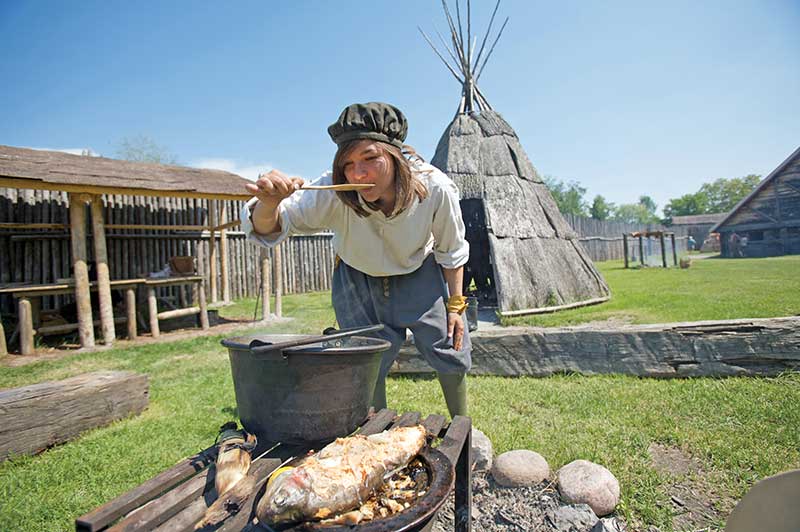
Photo by
Cruising the 30,000 islands
 Georgian Bay’s 30,000 Islands form the largest freshwater archipelago in the world, and were declared a UNESCO Biosphere Reserve in 2004. Spanning an area of more than 860,000 acres, the 30,000 Islands stretch for more than 120 miles along the eastern coast of Georgian Bay from Beausoleil Island to the French River.
Georgian Bay’s 30,000 Islands form the largest freshwater archipelago in the world, and were declared a UNESCO Biosphere Reserve in 2004. Spanning an area of more than 860,000 acres, the 30,000 Islands stretch for more than 120 miles along the eastern coast of Georgian Bay from Beausoleil Island to the French River.
Some of the islands are large and dotted with cottages, while others are mere hunks of granite that barely penetrate the water’s surface. In fact, there are more than 30,000 of them, but the exact number varies from one year to the next as water levels rise and fall. Much of the area is now protected from development by being designated as provincial or national parks, which means cruising through this area represents a real-life opportunity to literally travel back in time. Ospreys and bald eagles are common sights patrolling the channels and islands, while a huge variety of smaller birds and mammals like beaver, otters and black bears put plenty of wear and tear on that set of dashboard binoculars.
The route through the islands, properly known as the Small Craft Route, consists of multiple marked channels to ensure safe passage and keep those rocks at bay. While many experienced boaters describe navigating through the 30,000 Islands as a life-changing experience, this is one spot where you will absolutely want to keep one eye on the magnificent vistas and another on your charts. That’s especially true if you decide to spend a night or two on the hook — and you should because that is very much part of the 30,000 Islands experience. Always post a bow watch and go slowly when entering any anchorage for the first time, however, as house-sized chunks of granite are also a part of the 30,000 Islands experience.
When navigating north from Midland, you are considered to be heading upbound, so keep the red small craft markers to starboard.
Much of the southern end of the 30,000 Islands lies within Georgian Bay Islands National Park. The park charges a fee for tying up at its docks overnight, so pick up a seasonal permit at the park office in Midland before you head out. Also be sure to collect a copy of the park visitor guide, which is packed with useful info. There is no fee for anchoring within the park.
Georgian Bay Islands National Park
705-527-7200
parkscanada.gc.ca/gbi
Photo by



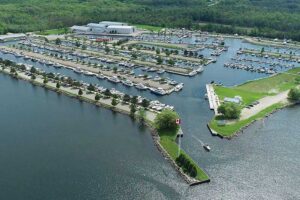


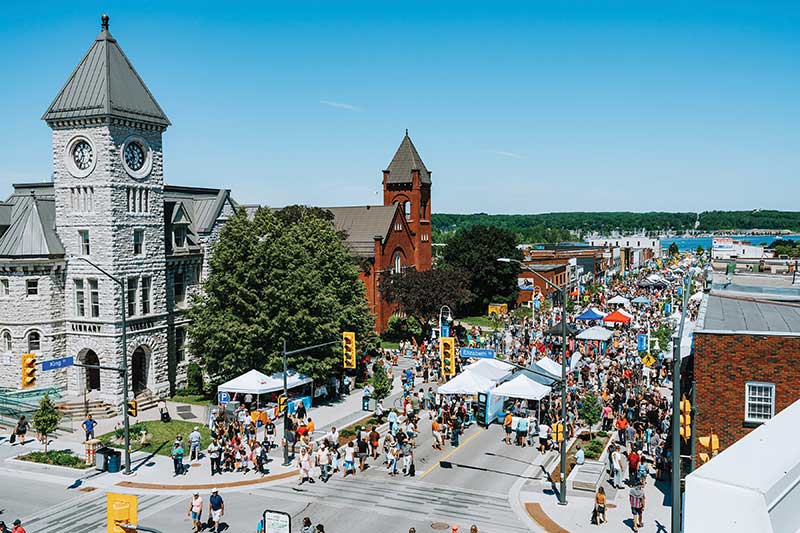
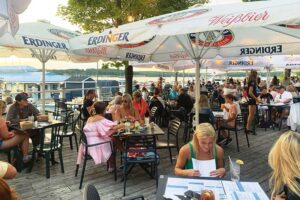 All the finer things
All the finer things